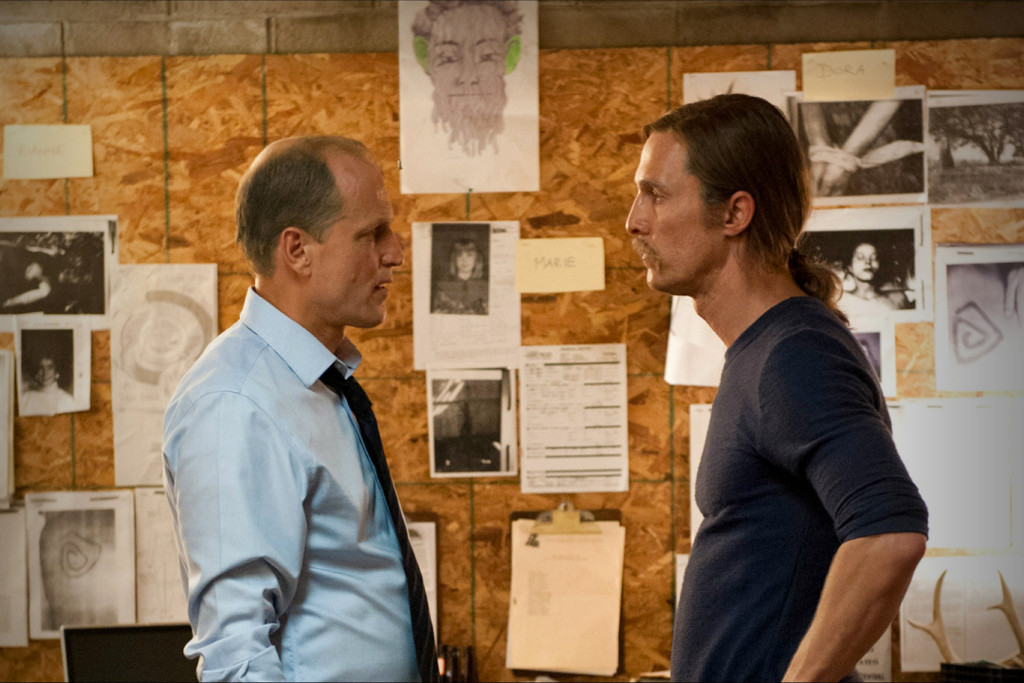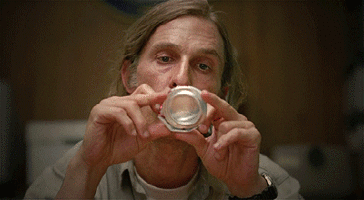Making Sense Of True Detective’s Spectacular First Season
Fan theories, gender politics and dubious heroes have made it the most talked-about show on TV.

Stieg Larsson was famously unhappy when The Girl With The Dragon Tattoo was released in 2008. His English-language publishers had opted for a more pleasant alternative to his original Swedish title, Men Who Hate Women. My take on this anecdote has always been that Men Who Hate Women is a profound, fundamentally-revealing title. It is a title that could be applied to so much modern art, as the writers of notoriously difficult men take them to task for their treatment of women. It’s a title that could have been reserved for True Detective.
The eight-episode HBO crime series — written by Nic Pizzolatto, directed by Cary Fukunaga, and starring Matthew McConaughey and Woody Harrelson — has driven its devotees crazy in all the right ways. The show is something of a flashpoint for the convergence of cinema and television. They’ve been on a collision course for some time, and True Detective is the moment of impact.
Quite aside from the fact that it features bonafide movie stars — as opposed to the ’00s tradition of featuring actors who had once been movie stars (see: CSI’s Laurence Fishburne, NCIS’s Chris O’Donnell, Law & Order: SVU’s Jeff Goldblum, etc) — it is a place where authorship is divided. In television, the author is the writer, and the director barely mentioned. In cinema, the director is all-powerful, with the writer rarely rating a mention. Pizzolatto and Fukunaga seem to be receiving equal credit for this stunningly beautiful and terrifying show, which follows two detectives investigating a series of sexualised murders over the course of two decades.
But what makes True Detective stand out is that it’s about something more than its surface level plot. In the final moments of the series, we get a glimpse of rare optimism from Cohle (Matthew McConaughey), as he suggests that there might be hope in the battle between light and dark. This is what the series was about: the light and dark fighting it out within each character. And also McConaughey getting existential — it was about that in a big way.
–
Anti-Heroes, Gender Politics, And Fan Theories
In ‘Haunted Houses’, the least talked-about but arguably most important episode, Cohle calls out Marty (Woody Harrelson) and the police force they both work for: “Goddamn. You, these people, this place. It’s like you all just eat your fuckin’ young, and that’s all fine so long as you got something to salute.”
Cohle’s point is that even the police are complicit in the crimes they’re out to solve. They may be out to avenge crimes against women, but they’re equally guilty of them. Men who hate women.
That’s the episode in which Marty sleeps with a girl that the two first met in a trailer park brothel ten years earlier, in Episode Two. She was underage in the trailer park then. Marty gave her some money, in a seemingly sincere gesture. Cohle cruelly asked him if it was a downpayment. Four episodes later, it was.
But Cohle isn’t some heroic archetype above the other mere mortals; he’s not that guy in a movie who’s infused with a preternatural valour that you can trust no matter what. Cohle is full of self-loathing after having sex with Marty’s wife Maggie, knowing he’s every bit as bad as the men he’s called out. There are no heroes here.
True Detective was accused of sexism because it was perceived to be placing women into neat boxes: the wife, the daughter, the prostitute, the victim. But it was the male characters themselves who were guilty of this: Marty loses everything because he can’t accept his mistress has a life outside of him, because his wife won’t stay inside the ‘wife’ box he put her in, because he can’t deal with his daughters not fitting his ideal. He is guilty, and the show punishes him for it. (A little bit, anyway. The underlined point in the final episode is that real villains are never punished. Cohle and Marty are talking about themselves as much as the criminals they’ve been chasing.)
The gender politics prompted some amazing discussions, but it wasn’t the reason people watched. There was the matter of the Yellow King, the mysterious and horrifying figure behind the crimes. There was the cosmic horror that drove the characters mad, one that suggested a primal supernatural subtext at play. This is what got everyone’s engines running.
The fan theories that peppered the internet were incredible. Sure, they all missed the point, but missing the point was the point. Sorry, I’m channelling Cohle there. I’ll explain.
It seemed to many that the show was initially pointing at Cohle as the killer. He was a bit weird, a bit of a nihilist, the kind of outsider who probably could commit these crimes. Detectives Papania and Gilbough, interviewing Cohle and Marty nearly twenty years later, are certainly pushing Marty towards that idea. And that’s when the internet thought it might be Marty.
The arguments were convincing in the sense of hearsay and conjecture, but it was never going to work out that way. It wasn’t that type of show. Nobody was going to pull off a mask at the end and, like a classic Bond villain, painstakingly take you through the blow-by-blow minutiae of their nefarious plan.
But the fact that everybody was speculating about this idea highlighted that the darkness existed in our two “hero” characters to such an extent, we thought they could be villains. Which one of them you suspected may have said a lot about you. Was it the intellectual philosophising Cohle, or the physical and instinct-driven Marty? (Zimbio’s surely made a quiz telling you which one you are by now.)
It’ll be fascinating to see where the show goes in its second season. We knew from the beginning that it would feature a different cast, but how Pizzolatto balances the crime elements with the existentialism without making it feel like a retread of Season One is going to be the most interesting part. In an interview with HitFix’s Alan Sepinwall, Pizzolatto revealed that year two will be about “hard women, bad men, and the secret occult history of the United States transportation system”.
If “hard women” suggests a new gendered direction for the leads, we may be looking at Men Who Hate Women from the other point of view. On a train. Run by the freemasons.
It sounds incredible already. Especially if he names one of the leads ‘Trudy Tective’. Think about it, Nic.
–
Lee Zachariah is a writer and journalist. He co-hosted the ABC2 film comedy series The Bazura Project, and is a co-presenter of film podcast Hell Is For Hyphenates. He tweets at @leezachariah.
